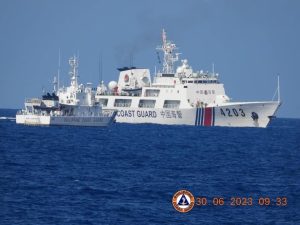Yesterday, China and the Philippines announced that they had reached an “understanding” that they hope will end a string of dangerous confrontations at a disputed shoal in the South China Sea.
In a statement yesterday, the Philippine Department of Foreign Affairs (DFA) said that the two nations had “reached an understanding on the provisional arrangement” for the resupply of the Philippine garrison stationed aboard the Sierra Madre, a Philippine Navy warship grounded on Second Thomas Shoal in the Spratly Islands.
The talks came two weeks after a major clash on June 17, in which the China Coast Guard (CCG) blocked a resupply mission to the Sierra Madre, injuring eight Filipino sailors, one seriously. Since the start of this year especially, the CCG has gone to increasingly forceful lengths to prevent the Philippines from resupplying the small contingent of marines stationed at Second Thomas Shoal.
The DFA did not share details on the arrangement, but said that it followed “frank and constructive discussions” between Chinese and Philippine officials during a meeting in Manila on July 2.
In yesterday’s statement the DFA said that “both sides continue to recognize the need to de-escalate the situation in the South China Sea and manage differences through dialogue and consultation and agree that the agreement will not prejudice each other’s positions in the South China Sea.” It added that “both sides agreed that the principles and approaches will not prejudice each other’s positions in the South China Sea.”
Exactly what this agreement might look like is unclear. Also yesterday, the Philippines said the resupply missions to Second Thomas Shoal would remain a purely Philippine operation, after the United States, the Philippines’ long-standing security ally, vowed to “do what is necessary” to support them.
“As far as the RORE (rotation and resupply mission) is concerned, we’re keeping it as a purely Philippine operation utilising Philippine ships, personnel, and leadership,” Jonathan Malaya, the assistant director of the National Security Council told the AFP news agency. “That may change depending on the guidance from top management but that’s the direction or policy at present.”
In any event, barely 24 hours had lapsed before the façade of comity came under strain. In the early hours of this morning, a Chinese foreign ministry spokesperson stated that under the “provisional arrangement,” the CCG would permit the Philippines to “send living necessities” to the personnel aboard the Sierra Madre – but only if the Philippines “informs China in advance and after on-site verification is conducted.” It added that China would “monitor the entire resupply process.”
In a follow-up statement today, the DFA statement said that spokesperson’s comments about “regarding prior notification and on-site notification” were “inaccurate” and diverged from what was agreed between the two sides. It again stressed that the agreement “was concluded with the clear understanding by both sides that it will not prejudice our respective national positions.” For the Philippines, this meant continuing to assert its rights in its maritime zones under the United Nations Convention on the Law of the Sea. (Second Thomas Shoal falls well within Manila’s 200-nautical-mile exclusive economic zone.)
The DFA statement added that the agreement was “done in good faith and the Philippines remains ready to implement. We urge China to do the same.”
Whether the misinterpretation is due to an error on the part of the Chinese spokesperson, or a deliberate attempt to shift the goalposts on the Philippines, remains unclear. But the fact that yesterday’s agreement has so quickly run into problems of interpretation does not bode well for its success or durability.
































